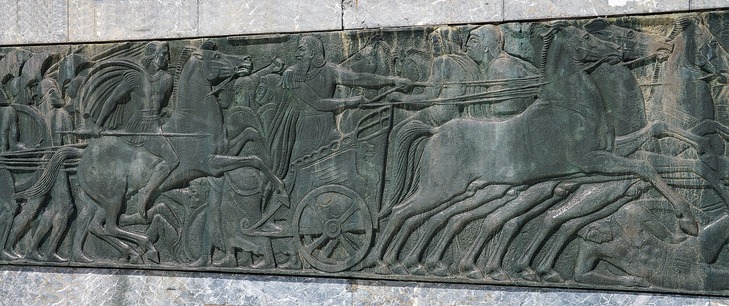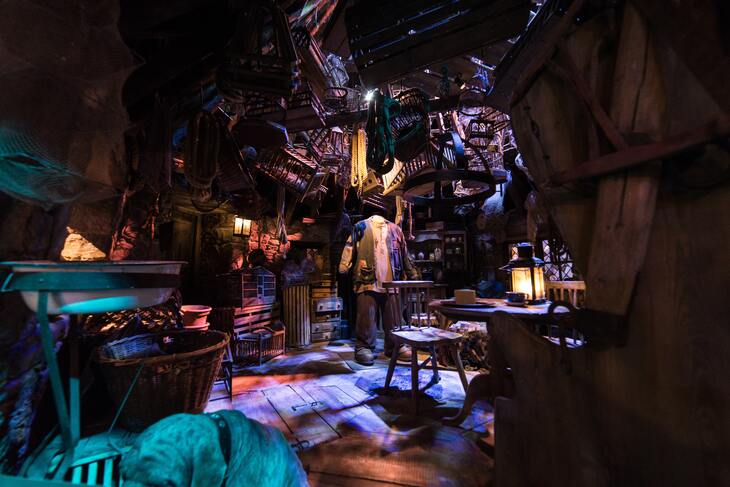Every story that makes a part of our history does not stand alone, its consequences repercuss onto generations after us. Whatever one misunderstanding may have occurred in the past, will reflect in the future of not only a people but of the character of the individual. It imprints into the consciousness of generation upon generation until its potency fades to a point of no recognition. It becomes a truth that no one bothers to second-guess, for it is easier to accept what is given than to search for the truth for oneself. Such passed down beliefs spread like cancer, uniting a people in the same belief system.
Although it may act as a bonding tool, it mostly consists of emotions such as anger and hate. As people bond over such beliefs, it becomes a part of their own identity, without which there would be a cause for concern as to who they really are. A mirror no one is willing to look into. Whatever we may feel toward another person or people is a reflection of us rather than a description of the other. However, blame and resentment are easier to come by and sustain. The energy they take from a person is simply wasteful. Instead of harboring emotional scars, it would benefit us all to let them heal.
Dale
Bilbo: “My dear Frodo, you asked me once if I had told you everything there was to know about my adventures. And while I can honestly say I have told you the truth, I may not have told you all of it. I am old now Frodo. I’m not the same Hobbit I once was. I think it is time for you to know what really happened. It began long ago, in a land far away to the East, the like of which you will not find in the world today. There was the city of Dale. Its markets known far and wide, full of the bounties of vine and vale. Peaceful and prosperous.”
The city of Dale was a wonder in its heyday. Peace and plenty abound. Every race was welcome to trade their commodities with others in a safe place. There was no trace of judgment, negativity, or discord. The film portrays Dale in a very colorful and lively manner. One could see the harmony that had once existed among the races. A harmony that had allowed them to prosper in their respective homelands. An interracial utopia.
The line of Durin
Bilbo: “For this city lay before the doors of the greatest Kingdom of Middle-Earth, Erebor. Stronghold of Thrór, King Under the Mountain, mightiest of the Dwarf Lords. Thrór ruled with utter surety, never doubting his house would endure for his line lay secure in the lives of his son and grandson.”
A stocky built but sturdy and resilient race of Dwarves. It comes as no surprise that along with their natural physical appearance, they would be secure of their own race. Thrór had two male heirs that would secure the line of Durin as the reigning family of Erebor. Both heirs were groomed to take over at some point, and both took part in the kingdom’s protection. Having a literal mine of gold and precious gems beneath his feet, Thrór’s security in his kingdom’s endurance could not wane.
Erebor
Bilbo: “Ah, Frodo. Erebor. Built deep within the mountain itself the beauty of this fortress city was legend. Its wealth lay in the earth, in precious gems hewn from rock and in great seams of gold running like river through stone. The skill of the Dwarves was unequaled, fashioning objects of great beauty out of diamond, emerald, ruby and sapphire. Ever they delved deeper down into the dark. And that is where they found it.”
As a race, they had a talent for mining. Much like the Dwarves in Moria with mithril, these Dwarves mined precious rock. Their architectural style was similar, overcompensation for the lack of height some would argue. The splendor and magnificence of both kingdoms is wonderfully obvious.
The Arkenstone
Bilbo: “The Heart of the Mountain. The Arkenstone. Thrór named it the King’s jewel. He took it as a sign, a sign that his right to rule was divine.”
A small rock with a galaxy seemingly rotating inside it radiating light was a discovery that would change the course of not only their future but the fate of all Dwarves. Although very beautiful and mesmerizing, the fact remains that it was only a rock. Thrór arbitrarily christened it the Arkenstone and gave it the meaning that it had. In itself, the rock did not have any healing or magic powers.
Its meaning could have been something completely different, had someone else stumbled upon it. As it was, Thrór claimed it for himself and his family. It was an instantaneous heirloom, one that would seal the rule of his kin after his demise. Thrór would have stayed King Under the Mountain, and his son and grandson would succeed him with or without the Arkenstone. However, its mere existence and attributed meaning solidified his standing more than any other ruler’s in Middle-Earth.
Breaking alliances
Bilbo: “All would pay homage to him, even the great Elven King, Thranduil. As the great wealth of the Dwarves grew their store of goodwill ran thin. No one knows exactly what began the rift. The Elves say the Dwarves stole their treasure. The Dwarves tell another tale. They say the Elf King refused to give them their rightful pay. It is sad Frodo, how old alliances can be broken. How friendships between peoples can be lost. And for what?”
With the Arkenstone safely positioned on his throne, Thrór assumed a more heightened position than he had already enjoyed. His interpretation of this accidentally found stone gave rise to the idea that there was a divine right for him to rule the kingdom. It also transpired that all others who had an interest in the production of their wealth were now suddenly placed on a wholly different plateau of power. There was no equality among the rulers anymore. It is interesting to note that not only Thrór indulged this fantasy of higher rule. Thranduil, a member of the immortal, wise, and most graceful of races, bowed to Thrór’s twisted reality.
The white gems of Lasgalen shown in the scene before the king Thranduil, leave him in awe of their beauty as he gazes upon them. In that particular scene, these White Gems were to be given to Thranduil. However, as he reaches out his hand toward them, the Dwarf holding the box containing them slams it shut, to Thrór’s utter delight. He never meant for Thranduil to have these Gems. Lasgalen, meaning Greenleaf, would imply the Gems already belonging to Thranduil and his family, specifically his wife.
Solely by the facial expression of Thrór is painfully obvious that the love for his wealth had surpassed any remaining sense of fairness, duty, or goodwill. Even Thorin, standing on the right side of his father’s throne was left surprised with his grandfather’s lack of responsibility towards this great ruler of the Silvan Elves.
Dragon sickness
Bilbo: “Slowly the days turned sour and the watchful night closed in. Thrór’s love of gold had grown too fierce. A sickness had begun to grow within him. It was a sickness of the mind. And where sickness thrives, bad things will follow.”
Greed had turned Thrór into a madman. The obsession with his own wealth led him to spend an inordinate amount of his time in his treasure horde. It seemed to be all that he could see and all that he could think about. As he twirled in his horde, the sparkle of his eyes and the awe his facial expression had turned into were a direct link to how his psychological profile had changed with the accumulation of wealth.
The coming of Smaug
Bilbo: “The first they heard was a noise like a hurricane coming down from the North. The pines on the mountain creaked and cracked in the hot, dry wind.”
Thorin: “Balin, sound the alarm. Call out the guard, do it now!”
Balin: “What is it?”
Thorin: “Dragon. Dragon!”
Bilbo: “He was a fire-drake from the North. Smaug had come. Such wanton death was dealt that day. For this city of Men was nothing to Smaug. His eye was set on another prize. For dragons covet gold with a dark and fierce desire.”
Thrór: “No!”
Thorin: “Come on.”
Even as the dragon broke through the doors of Erebor with ease, with all of Thrór’s army, with his grandson at the lead, attempting to stop this creature from taking over their kingdom, Thrór frantically scattered around his horde searching for ways to save his wealth. However, not even the Arkenstone survived. Had it not been for Thorin rescuing his grandfather, Thrór would have leaped after the Arkenstone, forfeiting his life to feed his greed.
Losing home
Bilbo: “Erebor was lost. For a dragon will guard his plunder as long as he lives.”
Thorin: “Run for your lives! Help us!”
Bilbo: “Thranduil would not risk the lives of his kin against the wrath of the dragon. No help came from the Elves that day, nor any day since. Robbed of their homeland, the Dwarves of Erebor wandered the wilderness, a once-mighty people brought low. The young Dwarf prince took work where he could find it laboring in the villages of Men. But always he remembered the mountain smoke beneath the moon, the trees like torches blazing bright. For he had seen dragon fire in the sky and a city turned to ash. And he never forgave and he never forgot.”
As the Dwarves escaped with their lives from the doors of their kingdom, Thranduil stood upon the mountainside, gazing at them as they screamed. There was no sense of empathy or sadness in his eyes. It seemed as if he only made an appearance to witness their demise. Cruel, even by his standards.
Thorin screamed for help but the plea fell on deaf ears. There would be no solidarity that day, nor any day since. It would seem that the grudge over the repossession of the White Gems left an indelible mark on this king’s pride and sense of compassion. This was the situation Thranduil needed to seek vengeance on the Dwarves’ sense of power. He was definitely on a higher reigning power now.
An eye for an eye
Thorin, although not directly involved with the White Gems betrayal, felt the consequences of the broken bond between their two peoples. Additionally, he must have thought that the one mistake his grandfather made would stand on its own, not having any influence on how they would be treated. However, Thranduil’s decision to not intervene at the sight of tragedy proves that both situations had the exact same value.
The Dwarves withheld the promised Gems so Thranduil will now abandon them in their time of need. One is a Gem transaction gone wrong, the other has to do with Thranduil’s integrity as a person, his core beliefs and values in life. Apparently they did not include helping fellow Dwarf in need. This would be his “eye for an eye”.
Could it be that Thrór felt in some way deficient and wanted to compensate for the accumulation of wealth? Could that be the reason behind his madness? Everyone is susceptible to the allure of hoarding whatever they find valuable. It is the mastery of controlling one’s own appetite for hoarding that is the key curving greed. But is it that simple?
Tolkien drew from the Icelandic Volsunga saga in which Fáfnir was a strong and fearless Dwarf, who killed his father to keep the Andvari gold for himself. Influenced by greed and ill-nature he transformed into a dragon and slept on his hoard of treasure. His insatiable greed and malice actually transformed his body into that of a dragon. Would have that been the fate of Thrór had not Smaug taken over his kingdom? We will never know.
Follow me to my next post.
Photo by Samuel Ferrara on Unsplash





